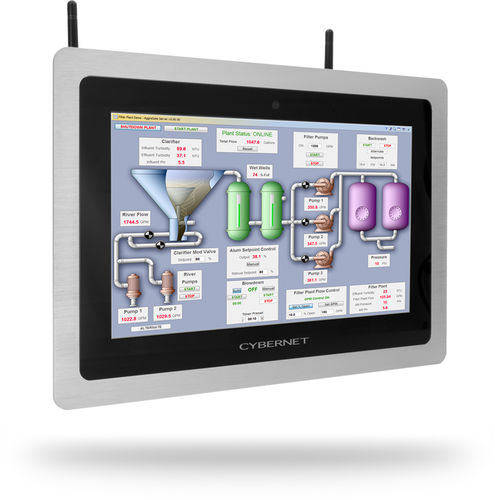
#Industry News
Smart Factories and their Use of Industrial Computers
Industry 4.0 has Remade the Factory
Though factories are no stranger to automation, technological advancements in the past decade have entirely reshaped the factory as we know it. By leveraging previously unheard of connectivity levels, smart factories can increase production, raise profits, and improve customer satisfaction.
What is a “Smart” Factory?
In a smart factory, IoT (Internet of Things) sensors integrated into manufacturing equipment relay information to industrial panel PCs and rugged industrial tablets to increase production efficiency through constant monitoring and self-optimization. Data visualization also allows factory support staff to respond to on-the-floor issues in real-time.
Why Are Industrial Computers Essential for Smart Factories?
Factories are harsh environments that most off-the-shelf computers cannot handle: machine vibration, industrial dust, physical debris, and extreme temperatures can destroy a computer’s internal components. Conditions can be so harsh that some companies have found themselves replacing their consumer-grade computers every three months.
Industrial computers are built to endure whatever conditions the factory throws at them. Rugged construction means they are IEC60068 certified for shock and vibration. Fanless cooling regulates temperature without moving parts or intake vents, protecting the interior components from both dust and extreme temperatures.
Production Bottlenecks and Data Visualization
IoT sensors and data visualization help prevent bottlenecks before they happen. Smart cameras measure throughput at every step of production, while IoT sensors monitor temperature, vibration, pressure, etc., to see if machines require attention. In this way, manufacturers can catch bottlenecks early, stoping production delays in their tracks.
Industrial panel PC with tempered shatter-resistant touchglass can visualize data while withstanding common production floor hazards. Used as an HMI Panel, these powerful machines can analyze and create a visual representation of your data in seconds.
Further, optional features such as 2d scanners, RFID, smart card readers, and biometric scanners can be used in conjunction with other sensors to increase productivity and efficiency.
Smart Sensors and Climate Control
Many older factories lack climate control systems due to the expense of running them. Fortunately, the technology behind smart manufacturing can also make climate control more cost-effective.
In one part of the factory, temperature sensors run by a mini rugged PC can detect a spike in temperature and direct exhaust vents to open, activate cooling systems, and even shut down equipment if necessary. In another part of the factor, other heat sensors could catch a concurrent drop in temperature and direct heaters to only heat that one area. By taking such decisions out of human hands, you can increase responsiveness and minimize the costs associated with climate control.
Inventory Management and the Power of Mobility
Inventory management can be a massive headache for any manufacturing operation. Even up-to-date inventory management systems force manufacturers to rely on third-party barcode scanners and other peripherals, which cannot themselves analyze or visualize the data they collect. It can be tempting to cut corners, but poor inventory management will inevitably cause a cascade of ever-worsening problems for your operation.
Workers can quickly scan small adhesive RFID tags affixed to the packaging, products, and other material assets with an RFID-enabled industrial tablet.
Unlike other scanning peripherals, industrial tablets are their own powerful wireless computing devices and serve as portable data visualization displays, alerting workers to inventory shortages as they happen.
Industrial tablets’ lightweight, rugged construction means they can handle drops and impacts often prevalent in busy industrial environments. The portability offered by industrial tablets makes shifting between operations on the factory floor a breeze. Additionally, optional 4G cellular capabilities allow operators to work anywhere, which improves responsiveness, speeds up production, and increases profits.
Final Thoughts
Smart factories are the future of manufacturing. Contact an expert at Cybernet today you are interested in learning more about how industrial computers can help you enter the world of smart manufacturing.





